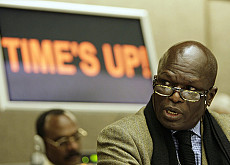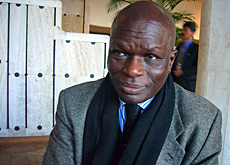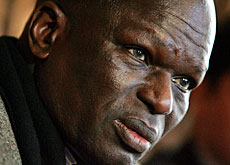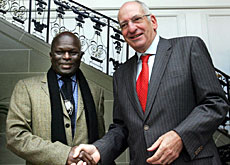Switzerland answers racism charges

Switzerland has distanced itself from a hard-hitting report by Doudou Diène, the United Nations special rapporteur on racism, which accuses it of racist tendencies.
The government said it would seriously examine the report on racism in Switzerland, which was presented at the Human Rights Council on Tuesday, and would step up efforts to combat racism and discrimination.
But it rejected Diene’s use of “individual incidents to draw conclusions about the general dynamism of racism and xenophobia in the country as a whole”.
In his full report, Diene maintains that “Switzerland has competent mechanisms and motivated officials with mandates to combat racism, but at the national level this reality is not recognised”. He accuses the authorities of a lack of any “coherent and resolute political and legal strategy against racism and xenophobia”.
For the Senegalese UN envoy this is caused by “deep-rooted cultural resistance within Swiss society to multiculturalism… especially where persons of southeastern European and non-European origin are concerned”. He adds that racism has become an instrument in political debate.
In reaction, the government said it agreed that racism was a problem, “deploring the incidents mentioned by Mr Diène” and added that it was aware that more had to be done at the federal, cantonal and communal levels.
But it said the high percentage of foreigners living in Switzerland and the generally successful integration of foreign residents were signs of the country’s openness.
It recalled that it was the Swiss public that had adopted the new asylum law, criticised by Diène, by a large majority.
“The government is convinced that the implementation of this law will in no way lead to discrimination,” it added.
Anti-racism commission
The Federal Commission against Racism called on the government and the cantons to heed the report’s recommendations, saying the UN envoy had touched on several burning issues.
Among his proposals, Diène had called for “a national programme of action against racism and xenophobia comprising national legislation… and a cultural and ethical strategy for the long-term construction of a multicultural society”.
The commission is urging the government to set up a roundtable with the country’s cantonal authorities every time such a report is published to follow up and properly implement recommendations.
In a seperate development, 16 Swiss human rights organisations announced on Tuesday the launch of an anti-racism network to better coordinate the fight against xenophobia, discrimination and racism.
swissinfo with agencies

More
Federal Commission against Racism
The UN special rapporteur on racism carries out visits to various states to see if there are problems related to discrimination.
After these visits, he submits a report to the UN’s Commission on Human Rights.
In 2002, Switzerland invited all the UN’s special rapporteurs to visit the country and file their conclusions.
Diène visited Switzerland in January 2006 to gather information for his report into racism in ten countries. After visiting Brazil and Japan, he chose Switzerland as it was a multicultural society that had seen numerous votes affecting foreigners.
The special rapporteur on racism notes that the Swiss authorities … have recognised the existence of problems linked to racism and xenophobia, but believe these problems … are only a “second-class phenomenon”.
He remarks that this assessment varies depending on the department and how high up the hierarchy the interviewee is: those nearer social reality [i.e. lower down the hierarchy] recognise more openly the manifestations of racism, racial discrimination and xenophobia. However this recognition becomes more diffuse as one goes higher up the hierarchy.
The members of foreign communities and national minorities who spoke to Diène explained, often with great emotion, how they experienced on a daily basis racism, discrimination, a xenophobic atmosphere, a feeling of loneliness within the population and fear of certain institutions, notably the police.

In compliance with the JTI standards
More: SWI swissinfo.ch certified by the Journalism Trust Initiative











You can find an overview of ongoing debates with our journalists here . Please join us!
If you want to start a conversation about a topic raised in this article or want to report factual errors, email us at english@swissinfo.ch.